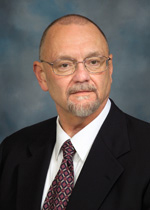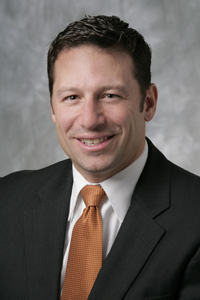 |
Thomas Rosenquist, Ph.D. |
On the budget front, Congress postponed taking any action on the remaining 10 fiscal year 2007 appropriations bills, including the bill that contains funding for the National Institutes of Health.
As a result, the NIH is currently being funded at the fiscal year 2006 level, making it the fourth consecutive year the NIH has received little or no budget increase, said Renee Fry, director of government relations at UNMC.
“This is obviously tough news for scientists who are already seeing less federal funding for their research,” Fry said. “We hope Congress will consider increasing funding for the NIH when it comes time to finalize the budget in February.”
In a move that stands to benefit UNMC researchers, Congress moved to reauthorize the NIH in a manner that allows the organization to make small annual spending increases over the next three years.
The approved spending increases are capped at 6.7 percent for fiscal year 2007, 8 percent for fiscal year 2008 and no cap in fiscal year 2009.
This is good news considering Congress had considered capping all NIH spending increases at 5 percent, said Tom Rosenquist, Ph.D., UNMC’s vice chancellor for research.
“It appears to be a step in the right direction,” Dr. Rosenquist said. “If we can get back to an annual increase, we can get back to the normal and healthy growth of the NIH. I take this congressional act as a good sign.”
Congress also passed legislation that would establish a zero percent update for 2007 Medicare physician payments. Without this legislation, physicians faced a 5 percent reduction in 2007 Medicare payments.
 |
Cory Shaw |
But physicians and patients may face even more challenges in the future, Shaw said.
“The planned reduction for 2008 is greater than 10 percent,” he said. “In the absence of immediate attention many Medicare beneficiaries will face very limited access to physicians.”
The Ryan White CARE Act was also reauthorized. The act calls for about $2 billion a year to go toward drugs and services for AIDS and HIV patients. One controversial element of the bill was an attempt to redirect funds to rural areas experiencing increasing numbers of HIV/AIDS cases that would result in urban areas receiving less funding. The final bill does reallocate funds to rural areas but limits the amount urban areas or states with large urban centers can lose.
 |
Susan Swindells, M.B.B.S. |
“I’m hoping that means something good,” Dr. Swindells said. “We’ve always had fairly modest awards. I’m hoping this will mean more money for Nebraska and translate into better care for the stream of patients that just keeps coming.”
Congress also adopted an amendment allowing for the redistribution of about $271 million in unspent 2004 and 2005 State Children’s Health Insurance Programs allotments among states facing funding shortfalls in 2007. The unspent allotments are available for one year and will benefit an estimated 17 states, including Nebraska.
“This will allow Nebraska to continue offering coverage to some children living in extremely impoverished conditions,” Shaw said.